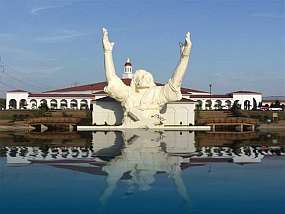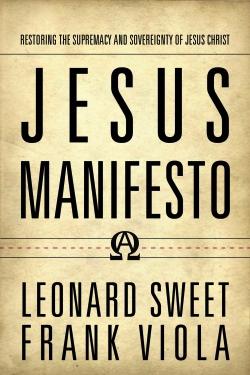 If you’ve not yet heard (despite the fact that it was the #1 Googled phrase on the Web so far today), the massive Jesus sculpture on I-75 north of Cincinnati burned to the ground last night after being hit by lightning.
If you’ve not yet heard (despite the fact that it was the #1 Googled phrase on the Web so far today), the massive Jesus sculpture on I-75 north of Cincinnati burned to the ground last night after being hit by lightning.
Some have called this “Touchdown Jesus” for the pose. Others labeled it “Big Butter Jesus” for its odd, buttery color.
Now it’s just a pile of ashes.
As I live in the area, I’ve driven by the statue many times. Like many people I’ve talked with, I feel strange about it. While I know other Christians who find it a source of inspiration, I was always uncomfortable when I saw it. To me, it depicted not the Savior of the World but the worst of Evangelical excess and misdirection.
At the risk of sounding like Judas, I’ve always been struck by the question, “Couldn’t this money have been used in a better way?”
I mean, I live in Ohio. Forbes.com noted recently that most of the major cities in Ohio made their Top 20 Most Miserable Cities list (including all the major cities in northern Ohio). With all that misery here in one state, you’d think Christians would have something to say—and do—about it.
Instead, we got a fiberglass and steel sculpture.
I dunno. Maybe I’m just a soulless crank. Still, I’ve got to pose that Judas question again.
Because, to me at least, nothing speaks faith more than Christians investing their time and money in the imperishable Kingdom, sowing into people’s lives in an unforgettable way.
The statue cost Solid Rock Church a quarter million dollars to build. Recently, it was repainted and repaired—more money.
Consider just these few ways the church could have used that money:
1. To help members adopt children currently living in orphanages or extended foster care.
2. To start an outreach to the many Ohio unemployed.
3. To plant churches in countries where no church previously existed.
4. To work toward racial reconciliation in downtown Cincinnati.
5. To provide loans to local people in poorer areas so they could start their own companies and break the grinding cycle of poverty.
Those are just five ways. Millions more exist.
The name “Touchdown Jesus” pokes fun at the depiction of our Lord with outstretched arms. But whenever I saw the 6-story sculpture, only one not-so-funny verse spoke to me:
I spread out my hands all the day to a rebellious people, who walk in a way that is not good, following their own devices…
—Isaiah 65:2
Right now, the loss of this statue seems to me to be a metaphor. A few years ago, Evangelicals were crowing about their newfound power and prestige. Now we seem to be on the ropes. And it is mostly our own doing, as we have forgotten what we’re truly to be about. We got enamored of earthly kingdoms, and the only true Kingdom was left to fend for itself.
Perhaps, yesterday, that Kingdom fended for itself in an unusual way. And perhaps that message needs to sink into our hearts just a little bit deeper.


